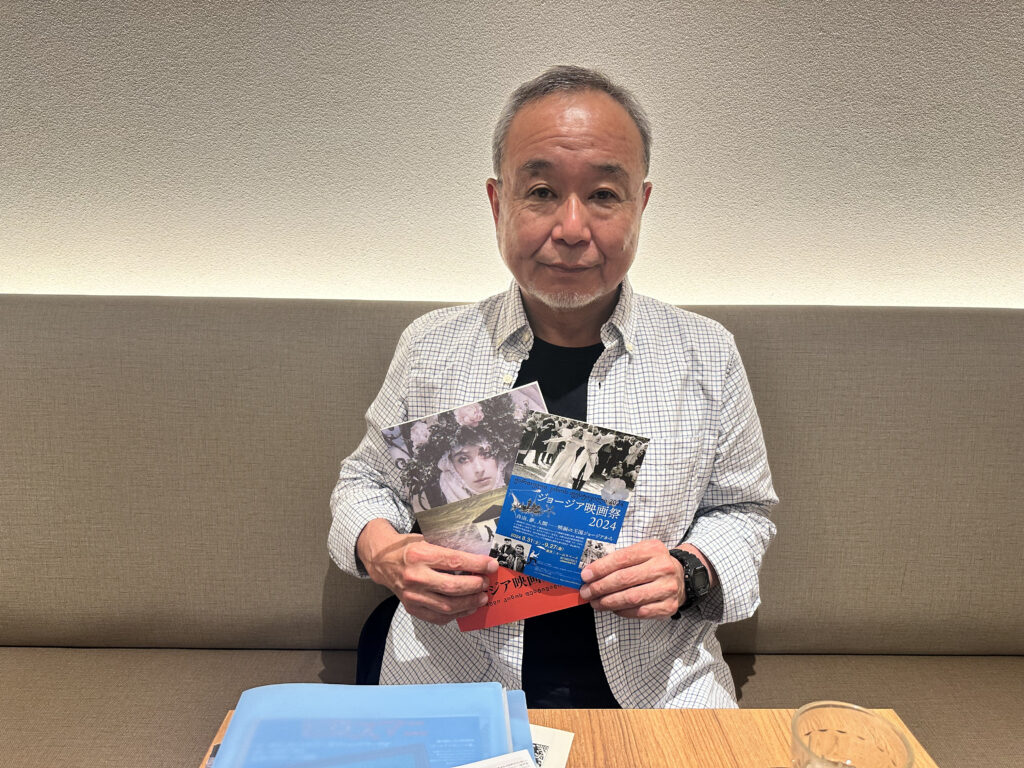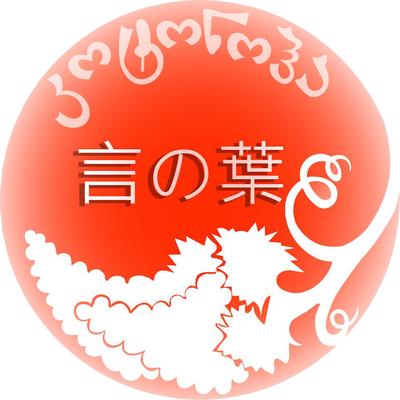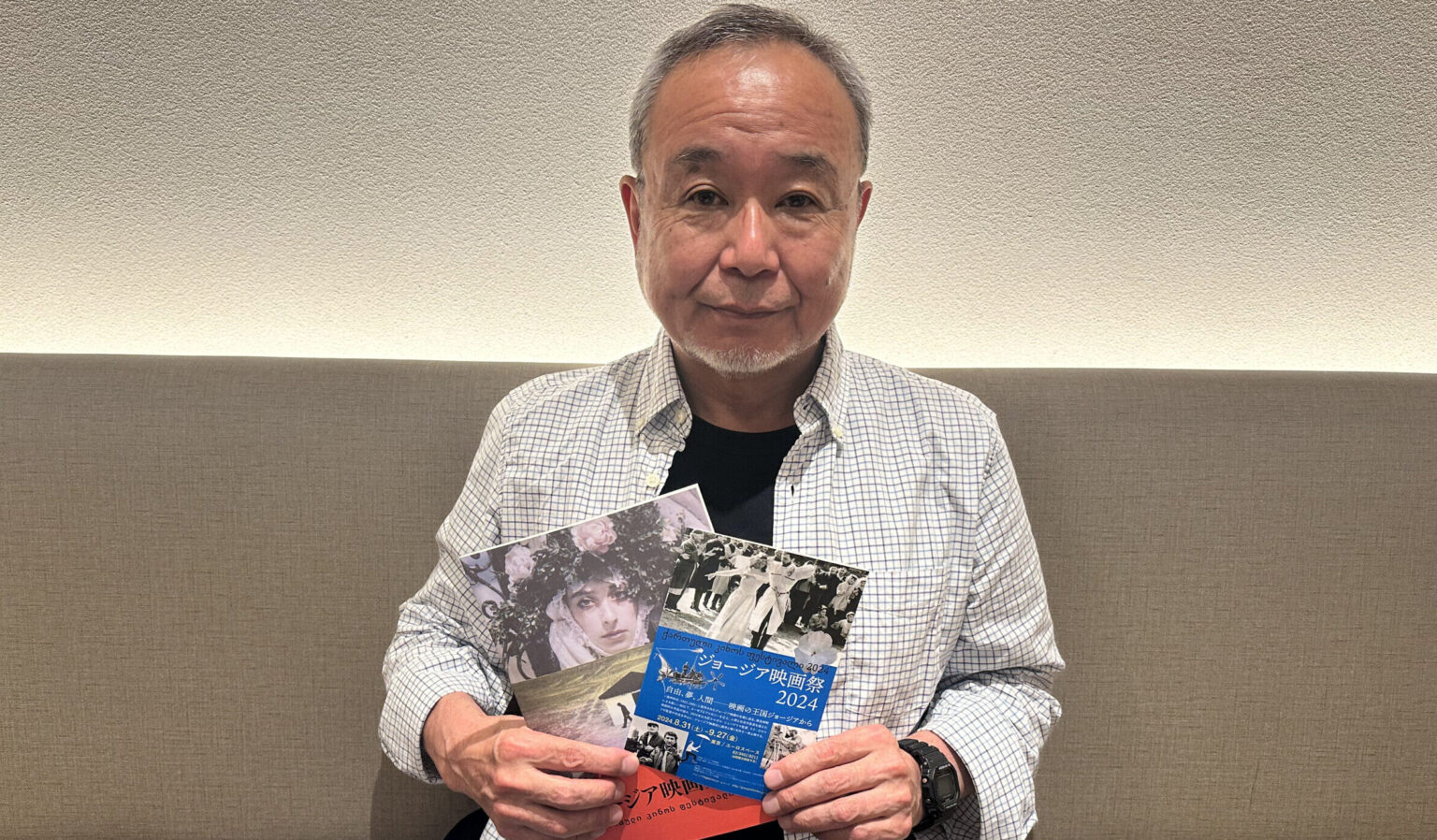【Profile】
Organizer of the Georgia Film Festival in Japan. Picture book author. Since 1974, he has been involved in screenings of world classic films at Iwanami Hall in Tokyo for about 45 years. His works include “A Journey to Georgian Cinema,” “The Wandering Painter Niko Pirosmani,” and “The Wandering Saint Painter Pirosmani.”He was awarded the Order of Cultural Merit by the Georgian government in 2022.
――What first got you interested in Georgian films?
Harada Takehide san:
From the end of 1974 until I retired in February 2019, I worked at a movie theater called Iwanami Hall, which closed at the end of July 2022. The purpose of Iwanami Hall was to discover and screen classic films from 60 countries around the world.
When I started working, counter culture was thriving in Japan and around the world. In addition, there was the 1970 Security Treaty protest, so most universities were closed, and I rarely went to school, but instead went to various places to study on my own and gain experience.
I entered Iwanami Hall when I was 20 years old. At that time, it was the early days of Iwanami Hall, so it was extremely busy, and I was working hard, focusing on introducing films. I liked wandering around and drawing pictures. In the midst of that, Ms. Etsuko Takano, the general manager of the hall at the time, seemed to notice that my face was shining when I previewed the film “Pirosmani.” She said to me, “I will entrust this film to you.” I was 24 years old at that time.
However, there was no internet or anything back then. It was called “Gurzia” at the time and there were only about 10 lines of explanation in the encyclopedia. There was no information about Pirosmani. However, through the film, I developed a deep interest in Pirosmani and Georgia.
During that time, the first guest from abroad for Iwanami Hall, Giorgi Shengelaia, visited. Seeing me fascinated with Pirosmani, he said, “If you truly want to know Pirosmani, you must know Georgia. This film contains all the feelings, history, culture, and climate of the Georgian people.” This strengthened my desire to visit Georgia.

――So the existence of Pirosmani was what prompted you to later go to Georgia.
Takehide Harada san:
I was very busy with my work. There were days when I would return home just to take a nap. During that time, I thought the company wouldn’t reject if I went on a honeymoon, so I went to Georgia via Moscow under the guise of a honeymoon.
Before going to Georgia, I wrote a letter to Director Giorgi Shengelaia, not knowing if it would even reach him there. When I arrived at the Georgian airport, Director Giorgi Shengelaia and his son, Nikusha Shengelaia, were waiting for me. They took me around to various people involved in Giorgi’s films for a week, experiencing things like supra and polyphony, and Georgian dance. Despite it being a honeymoon, I didn’t even hold my wife’s hand. She was also enchanted by Georgia. I was amazed by the depth of the beauty of the polyphonic harmonies and the skill of the Tamada in uniting the guests at the supra.
I was astonished that such a small country had such a unique and original culture. This made me want to introduce Georgia and Pirosmani paintings, which were almost unknown in Japan. Later, I learned that there were people interested in Georgia in various fields, such as Mr. Seiichi Kitagawa, a history expert, Mr. Tadao Shitomiya, a language expert, and Mr. Minoru Morita, a folk music researcher. By closely connecting with such people, I aimed to deepen my understanding of Georgian culture and spread Georgian films through Iwanami Hall.
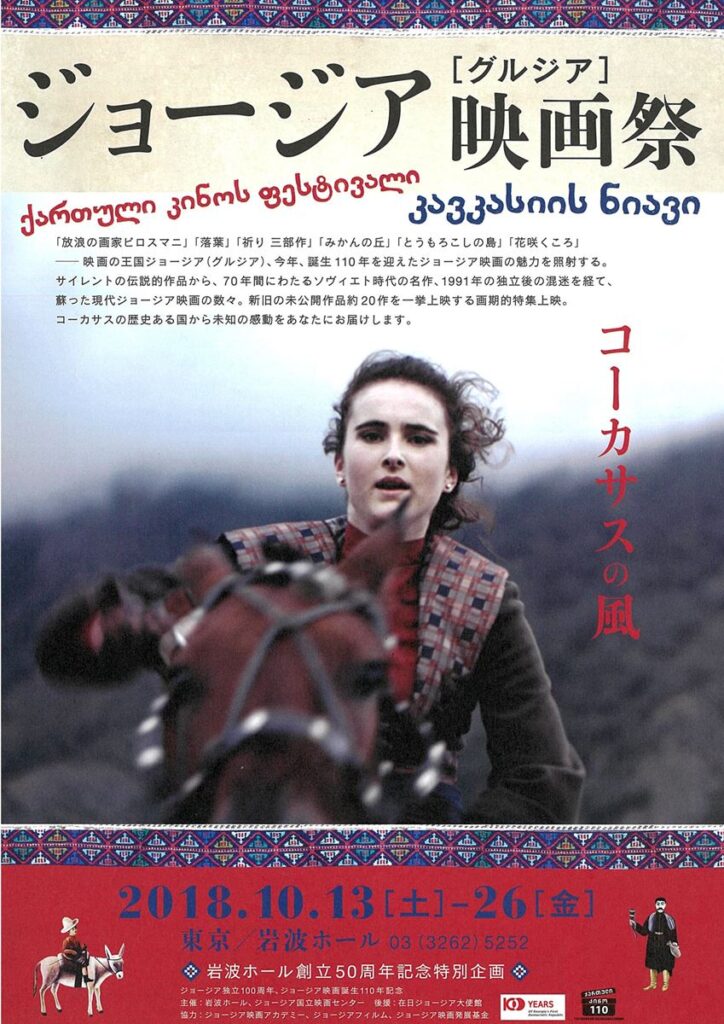
―― What led to the organization of the Georgian Film Festival?
Takehide Harada san:
We used to screen Georgian films intermittently every few years. Although I always wanted to hold a Georgian Film Festival, initially, films were on film reels weighing 30kg each. Transporting them from Georgia and adding subtitles cost a lot of money, making it infeasible. Now, with digital films, it has become possible.
The first Georgian Film Festival was organized after we re-screened “Pirosmani ” at Iwanami Hall in 2015. At that time, I asked Giorgi Shengelaia to recommend someone who could write about the current state of Georgian films. He recommended Marina Kereselidze, a film historian. When I asked her to write the manuscript, she sent a truly wonderful piece that deeply moved me, making me want to screen more Georgian films actively.
I met Marina Kereselidze in 2016. At that time, the release of films like “Corn Island” and “Tangerines” was decided, and I was interviewing directors like Giorgi Ovashvili and Zaza Urushadze. Amidst that, I met Marina Kereselidze and told her about my desire to hold a Georgian Film Festival.
I thought Georgian films existed in Georgia. However, the original negatives of Soviet-era films were mostly stored in the Moscow film archives, and many positive prints were damaged in a 2004 fire at the storage site. Restoring and digitizing them was not easy, but slowly, recovery and digitization work began.
In 2017, I connected with people from the Georgian Film Center, and with the support of Iwanami Hall, I decided to start as much as possible. Even if we got the films digitally, adding subtitles was expensive if done by contractors. Kazuyuki Otani san, who was working on digitization individually, agreed to help through mutual acquaintances.
Thus, by collaborating with translator Yasuhiro Kojima and digital screening material creator Kazuyuki Otani, we were able to proceed with organizing the Georgian Film Festival. On the other hand, screening new films was an issue. Even if Georgian directors allowed free screenings, new works were handled by overseas sales companies, requiring negotiations. Despite this, I worked hard, contacting everyone by myself to make it happen.
Regarding Soviet-era classic films, directors and archive associates trusted me enough to say, “We wish there were more people like Harada around the world.” This mutual trust and cooperation enabled us to organize the first Georgian Film Festival.
The second Georgian Film Festival took place after I retired from Iwanami Hall. Although Iwanami Hall provided the venue, it still incurred costs. I used my savings and unfamiliar for me social media for PR to make it happen.
The first Georgian Film Festival lasted two weeks, while the second ran for four weeks and toured nationwide, becoming a great success. The revenues from local screenings were distributed to the directors, copyright holders, and their families, who were very pleased, saying, “Japanese people are very honest. We’ve never experienced something like this before.”

―― Could you tell us about the highlights of the third Georgian Film Festival scheduled for autumn 2024?
Takehide Harada san:
I am excited to finally get in my hands restored works by Director Gogoberidze and Director Eldar Shengelaia, Giorgi Shengelaia’s brother, films I’ve always wanted to screen. We plan to show a total of 40 films, each infused with my thoughts and feelings.
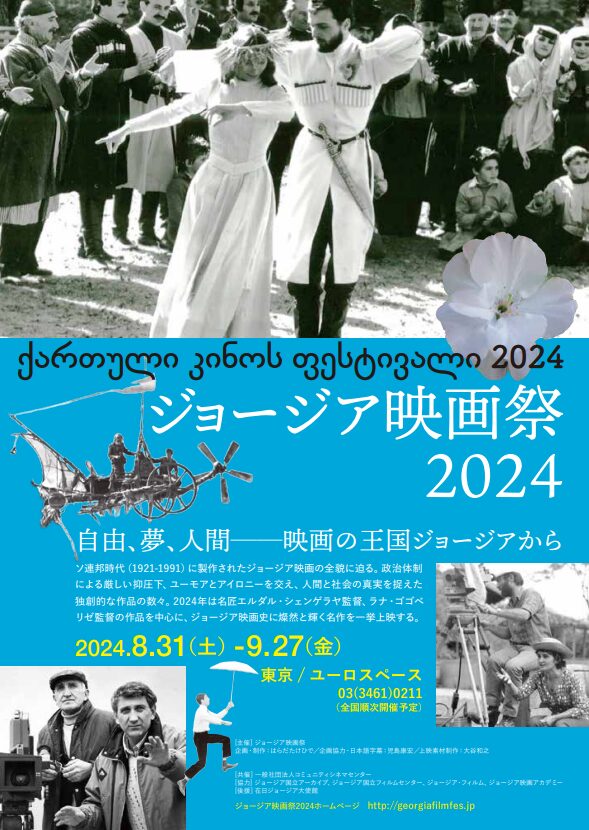
―― You are currently writing a book titled “History of Georgian Films -Freedom, Dream and people” What is the thought behind this book?
Takehide Harada san:
I am now 70 years old. The loss of long-time friends and collaborators, including Director Giorgi Shengelaia, during the COVID-19 pandemic left me with a profound sense of loss. The passing of Toru Inoue, a Russian film expert, was the final blow. To research the Soviet era, his cooperation was crucial. Just as we were discussing our collaboration on Georgia, he passed away.
I realized I might not have much time left and felt the need to record as much as I know. With Mr. Kojima’s cooperation, I am compiling my accumulated knowledge. Just as understanding Pirosmani requires understanding Georgia, understanding Georgian films necessitates understanding Georgia. The book’s introduction covers Georgian culture, religion, language, wine, and history, along with the current state of Georgian films. It also includes information on polyphony, Georgian cuisine, Tbilisi, and supra—essential knowledge about Georgia and its films.
Japanese people tend to think from a Japanese perspective. For example, they still don’t fully understand Georgian wine. To Georgians, wine is almost a part of their identity. Toasting to the deceased at a supra is also deeply meaningful. Moreover, how filmmakers resisted during Stalin’s era is not recorded in writing because it couldn’t be documented during the Soviet era. Georgians only recently began to speak about it. Although I am a foreigner and not deeply researched, I feel compelled to leave a written record.
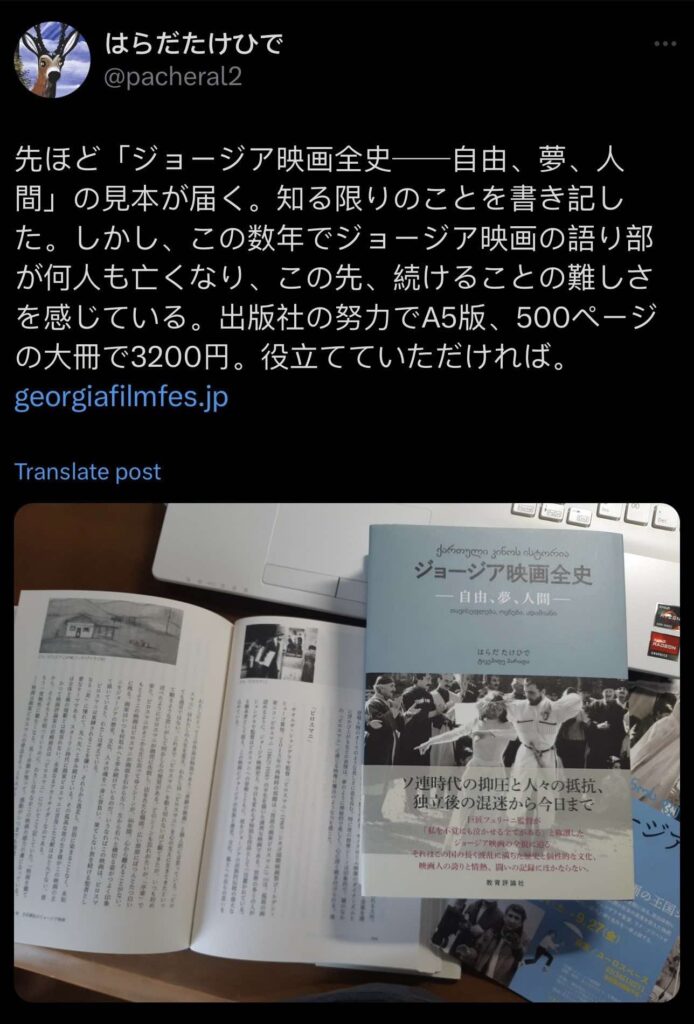
―― What do you think is the charm of Georgia?
Takehide Harada san:
I have been fascinated by Georgia for 46 years since 1978. When I ponder why I have been captivated by it for so long, I feel I am under Georgia’s spell. It’s hard to put into words.
When President Zurabishvili visited Iwanami Hall in 2019, she said, “Georgia has become a country of arts because there is no war now.” I understood her point. Despite its difficult location since ancient times, Georgia has survived and endured. This is because at the core of Georgian people lies a strong cultural identity, which includes religion, language, and customs, allowing them to repeatedly regenerate.
Director Kokochashvili once said, “Georgian culture is deteriorating,” which I feel is true for Japan too. Movie theaters like Iwanami Hall and local bookstores are disappearing, and I wonder if it’s okay to leave it like this.
Culture is essential for humans to remain human and for Georgians to remain Georgian. I am impressed by the love, courage, and passion for Georgian culture, as well as the pride in being Georgian, evident in their literature and films during the Soviet era’s political and social oppression. I hope this can be conveyed through films.
What I like the most in Georgia is the Georgian people. Words are also very difficult to convey this emotion and attitude, they are very sincere and genuine, this and many other positive qualities of theirs fascinate me and excite me.
―― As an illustrator, you mentioned that you were greatly influenced by the Georgian painter Pirosmani. You also watched a movie about him. What exactly fascinated you about Pirosmani?
Takehide Harada san :
After I came across Pirosmani’s work, he remained forever in my mind and became an inspiration for my work. It carries the ideal land of Georgia and leads from the infinite past to the infinite future.。
Georgian people always look strict and dingy, but once you get to know them and get close, they become very friendly. I once said, “Georgians keep in their hearts the thorns of the rose of the memory of the ancient Georgian paradise.” Georgians cannot remove the thorn from the rose, so they feel that, in a certain sense, they carry the dream of the Georgian paradise on their shoulders.
I believe it’s essential to leave behind this sentiment in my book and the 3rd film festival to preserve it as a period in my life.
